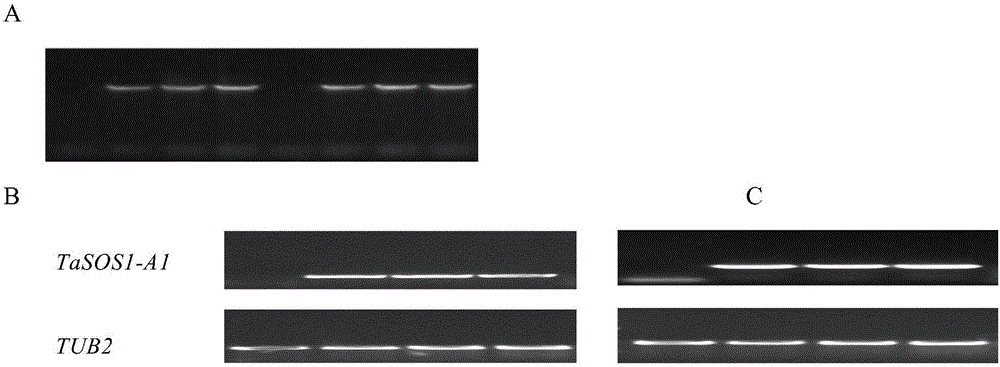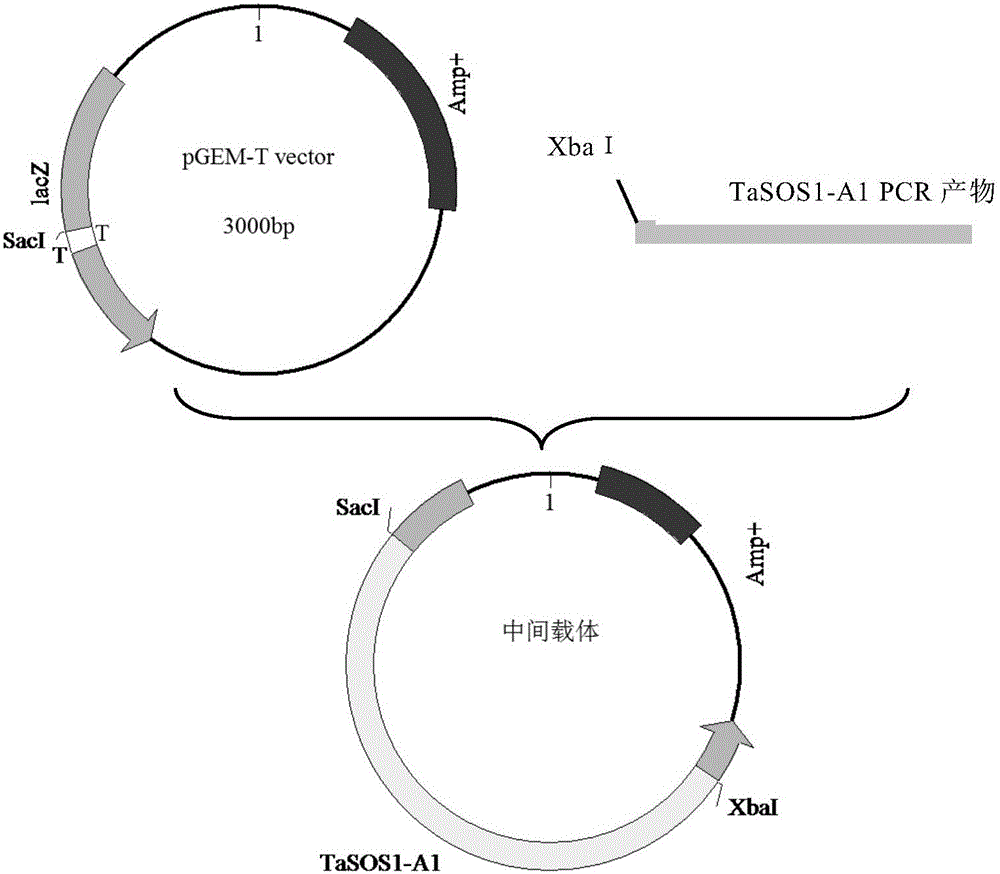A Na<+>/H+ antiporter gene and applications thereof
A technology of antiporter protein and gene, applied in the field of genetic engineering, to achieve the effect of increasing accumulation and improving salt tolerance
- Summary
- Abstract
- Description
- Claims
- Application Information
AI Technical Summary
Problems solved by technology
Method used
Image
Examples
Embodiment 1
[0026] Example 1 Wheat plasma membrane Na + / H + antiporter gene TaSOS1-A1 the acquisition
[0027] 1. Wheat plasma membrane Na + / H + antiporter gene TaSOS1-A1 The separation specifically includes the following steps:
[0028] (1) Will wheat branch 26 ( Tritium aestivumL.) seeds were surface-sterilized with 10% Kao aqueous solution for 10 minutes, and washed 3 times with sterilized distilled water. Put the seeds into a Petri dish with two layers of sterilized filter paper, and after 2 days at room temperature (90% of the seeds germinated), put the Petri dish in a refrigerator at 4°C for 24 h to homogenize the germinated seeds. Then put the petri dish in a culture room (23°C, 16 h light / 8 h dark) to grow for 2 days, put the seedlings with consistent growth into a container containing 1 / 2 Hogland nutrient solution for hydroponics, and take the seedlings about 7 days later The leaves were washed and blotted dry, quick-frozen with liquid nitrogen, and stored in a -80°C...
Embodiment 2
[0035] Example 2 Wheat plasma membrane Na + / H + antiporter gene TaSOS1-A1 function of
[0036] 1. Construction of Dicotyledonous Binary Expression Vectors
[0037] Will TaSOS1-A1 The upstream primer of the gene plus the XbaⅠ restriction site 5´- GATCTAGAATGGAGACGGAGGAGGCCG-3´, the downstream primer is 5´- TCAGCTGCCTCGCGGTGG-3´), to TaSOS1-A1 The full-length T vector plasmid was used as a template for PCR amplification. The PCR products were recovered, connected to pGEM-T Vector, and then sequenced. The correctly sequenced plasmid TaSOS1-A1-T and the binary expression vector pCAMBIA1300-35S–GUS (referred to as p1300-GUS) were digested with XbaⅠ and SacⅠ, and the corresponding fragments were recovered, ligated and transformed; colony PCR was identified as the extraction of positive clones The plasmid was further identified by enzyme digestion, and the correctly identified plasmid p1300-TaSOS1-A1 was preserved for future use. The construction process of dicotyledonous ...
PUM
 Login to View More
Login to View More Abstract
Description
Claims
Application Information
 Login to View More
Login to View More - R&D
- Intellectual Property
- Life Sciences
- Materials
- Tech Scout
- Unparalleled Data Quality
- Higher Quality Content
- 60% Fewer Hallucinations
Browse by: Latest US Patents, China's latest patents, Technical Efficacy Thesaurus, Application Domain, Technology Topic, Popular Technical Reports.
© 2025 PatSnap. All rights reserved.Legal|Privacy policy|Modern Slavery Act Transparency Statement|Sitemap|About US| Contact US: help@patsnap.com



